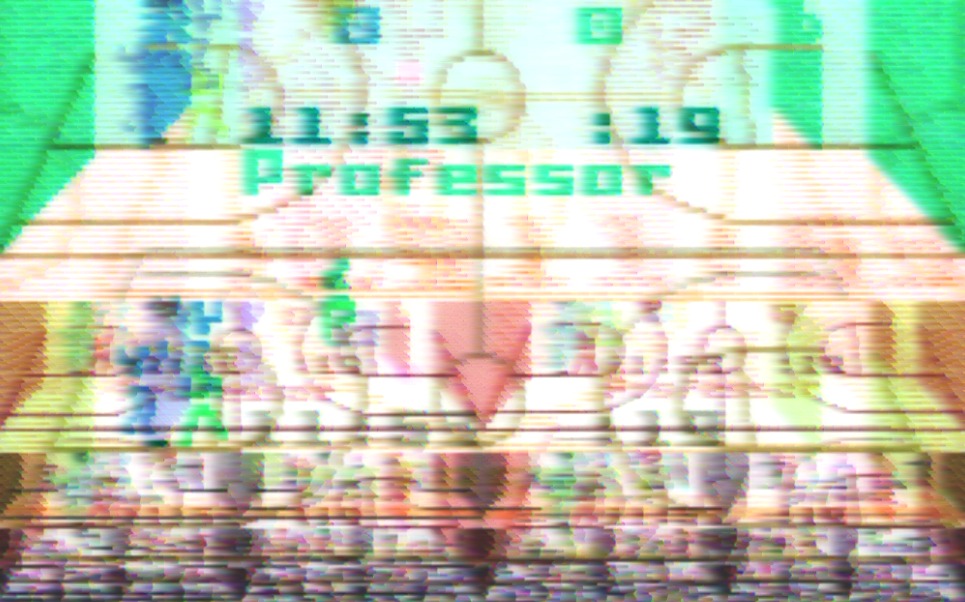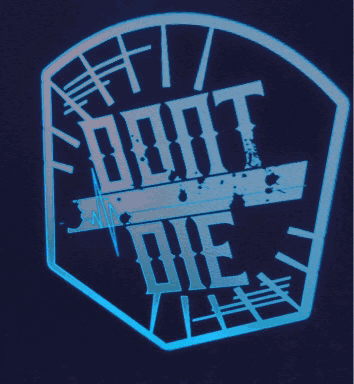- Brian
Let's see. Brian Gross. I am now currently in Woodland Hills, California, and the loss of interest was just changes in lifestyle, and some dramatic changes as well. I actually sold my TV when I moved a couple years ago. I never replaced it. I downsized my life. The Wii that I had, the Nintendo Wii, I gave to a friend of mine who had a bunch of her stuff stolen, and someone had reached out and said that a mutual friend, this had happened to them, and I decided, you know, I'll give this person my Wii console and some games. They were so happy to have it, and before I knew it I was just sort of out.
You know, I mean, there's certainly some RPG's on my phone that I like to play with, but other than that it was just changes in lifestyle that put me in a position where it's like I don't -- I'm not playing games. Plus, work as well. I mean, I have a big workload and that's my focus right now. When I'm not working I'm usually running around; whether it's literally running or playing sports, or whatnot, so they didn't put more hours in the day unfortunately.
- David
You said you’d been playing since 1980, so --
- Brian
Yep.
- David
Obviously that's like childhood, but what did your bell curve look like?
- Brian
I mean, I still have tucked away in my mom's garage the two original Intellivisions, and the long console, the shorter smaller console. I still have all the games that I have. I think I still have a lot of the boxes. As a kid I loved -- I was an Intellivsion kid. I was not an Atari kid. We would go to a friend's house and I would play on their Apple IIe, and we'd always play the '84 Summer Olympics game [Summer Games], which I still think is one of the best videogames ever.

It just started from there. I mean, I was definitely into the sports games. I would always get the new sports games that came out, and then got into Nintendo and Genesis, and then I had the Sega 32K, or whatever it was called. I still actually have that console. I was given a demo console of that, and I still kept it and a bunch of the games; I thought that was a great thing. PS1, PS2, and then my brother had a Xbox. I think he still does, I'm not actually really sure. Then, I had a Wii; I'm probably forgetting one or two consoles in the middle there, but that was, you know, that was it.
- David
Sounds like you were dutiful about it.
- Brian
Yeah.
- David
Was there a point where you realized like maybe you’re just sort of going through the motions of it?
- Brian
Honestly, it was time. It was like, “Do I sit at home, play videogames, or do I go out?” Something was going to be sacrificed in my life, and that was going to be it. You know, I got a lot of games for free because I had friends at EA and different companies where I'd get games sent to me and I'd check them out and play them, and what not. So, I mean, it wasn't financial, it wasn't anything like that. It was just loss of time.
- David
This sounds a little extreme, but did you mourn the loss of something? Do you miss it?
- Brian
Yeah, there are times. Back when Guitar Hero was big, there'd be nights I'd come home and before I'd go to bed I would just play that just to sort of get out whatever aggression I still had from the day and do that. You know, there are times I definitely still miss gaming, that definitely exists.

- David
Well, there’s a throughline where -- and I’m sure you know this from your work -- celebrities have this thing in common when they talk about videogames. That is, there’s a correlation between them quitting and then eventually getting successful afterwards. They’re devoting their time to other endeavors. Is that part of it?
- Brian
No, not at all. I mean, I've been fortunate that I've had my company for 16 years, and -- no, one has nothing to do with the other. I think it just has to do with the changing times. There's so much going on in our world, and there's so much to do, and something’s going to get lost in the shuffle.
- David
Do any of your clients play videogames, or are they also too busy?
- Brian
You know, we don't have those kind of conversations. I think some of them do, but I definitely haven't talked to a lot of them about that, so I’m not sure. I'm going to say yes, I think some of them do; certainly younger clients that I work with are gamers. I don't necessarily know about the older ones.
- David
I guess for this to make sense for people reading this, I don’t know how you describe or phrase what you do, but you’re a publicist for celebrities.
- Brian
Yeah, I work with all different types of entertainers, and it's all in mainstream. I've worked with the likes of Sasha Grey, and I've worked with Gene Simmons, so I mean, it's been a variety. I work with Michael Bean. So I work with a variety of celebrities and companies as well.
- David
Even though you’ve moved on, do you still feel nostalgia? Like, do you feel older games are “better” than newer ones? Is there’s something in older games that’s not present in more modern ones based on what you see in commercials or whatever?
- Brian
You know, listen. When you grow up playing 8 and 16-bit, and then things like Intellivision Basketball, which were three-on-three, and -- here's something I used to do. I would keep statistics on notecards of my teams, and I would create the season, and I was into it, man. Yeah. The nostalgia is like -- for everyone, nostalgia looks back on their childhood a million different ways, but for me it was coming home, or waking up earlier in the morning, especially if I got a new videogame, that was it.
I mean, the games these days are unbelievable. You know, there's no comparison to what they are, but the simplicity of the older games in the ‘80s? I'm happy that that's my childhood. It doesn't compare to videogames of the last 10, 15 years, but anyone in my age group who grew up on Intellivision and Atari, has to be like, “That was awesome! That was fun!” Because they were simple games, but they were a lot of fun.
- David
Growing up with this stuff, you mentioned a few different systems. But to what level did you get into it all? Were you buying the magazines?
- Brian
I was a sport -- I'm not an RPG guy. Even though, like I said, I have a Star Wars one on my thing. But I was a sports, and sort of like some -- not RPG, but some action. I can't think of -- the ninja one; I can't think of the name of it. I was into that. Yeah, I did some reading on that, but I found the magazines at the time were focused more on the RPG stuff, which just wasn't my thing. I would do some reading.

- David
Did you stick with those magazines as they became websites?
- Brian
Some, but then it just reached a point where I was just playing and not really following. I definitely wasn't a reader to the extent of most gamers, hardcore.
- David
Did you feel like those magazines or websites had an impact on the things you got interested in?
- Brian
No. I knew what I liked. I don't think the magazines did. I knew the brands I liked. So, for me, they didn't have that kind of impact, I can honestly say.
- David
What was the distinction? Like, you mentioned a little about what you liked in games, but why were those magazines not overlapping?
- Brian
I just think I just kind of knew what type of games I liked and who made them. At the time there was only so many. It didn't have that kind of impact that other things would. I'd even It just didn't. I really can't define the reasoning for it, but I just remember I just would go into the stores and I kind of knew what games I was interested in.
- David
What sort of stuff were you interested in? I know you mentioned sports, but what else?
- Brian
As far as videogames?
- David
Yeah.
- Brian
Oh man. It was all baseball, basketball, football, soccer.
- David
Yeah.
- Brian
I still -- I didn't get rid of them. When EA did, they did a rugby game, I don't know if they still do. They did an arena football game. There as another they did. Everything EA Sports I was into, and what was cool was I was getting a lot of them for free, so I couldn't complain.

- David
Well, so you’re in the unique position as a PR person who doesn’t work in the industry and can talk a bit about this. The videogame industry is not all that transparent, even as far as very basic creative decisions. I don’t know if anyone at Ubisoft has ever explained why Assassin’s Creed is a thing they wanted to make. Or if they have, it’s a short quip or a vague statement of intent. But you do a lot of work in the film world, and what’s the real harm in getting to know people and their opinions -- people who are the equivalents of, say, best boys, gaffers, or set designers?
- Brian
You know, I think there's always a curiosity with that, but the fact of the matter is it's never going to be as exciting as one thinks it is. You're only going to go behind the curtain so far, and you're only going to see so much. I think in many aspects you don't really want to go behind the curtain. Let what you're being shown be what you want to see. In this day and age there's so much media that exposes a lot of that. I don't necessarily think it's a good thing it exists. It's giving people too much of what they don't need.
- David
What’s the damage in it?
- Brian
I just think people will get disappointed.
- David
Yeah?
- Brian
You know? I think that's it.
- David
How do you think games come together? Who do you think makes the creative decisions?
- Brian
Well, I mean, I've had friends work in the industry over the years. So I know the amount of people it takes to make a game, and I know an idea can start anywhere. Just like every form of entertainment an idea comes from somewhere and then it's drawn on a napkin by a developer, or by who knows what, and then it takes shape. You've got the disruptors, you've got people that will say that's not going to work, we have to do that. I mean, there's a lot of things that go into the creation of a form of entertainment, from the idea to the final product. So I know it's certainly not just one person.
- David
The way the media has written about videogames, even really big ones, that’s sometimes the impression they’ll give even if they don’t mean to. And I’m asking after the lack of transparency, partly, in connection with labor issues in the game industry. I’m curious to hear, without you naming names unless you’d like to, if there are things you hear your friends talking about that they’d like to see shift, evolve, or change in the industry?
- Brian
As far as the videogame industry, the shift has been I've seen a lot of people get the hell out. That generation where younger people get in and the older people move onto other things, so, you know, there's always that kind of shift when you're involving something of entertainment, and younger demos. Like, you know, I'm not that the demo that the videogame industry is selling to, so they're looking for younger people. Thus, they're looking for younger people to lead them as well. That's always the challenge when you are selling product to younger generations: You want their voice.

- David
What seems to be the age where you notice they're getting out? The people on the supply side.
- Brian
Yeah, I would say mid-thirties. I would say thirties, early forties. I think there's certainly an aspect of the adult that goes, “I'm still playing videogames, what's wrong with me?”
Yeah.
Unless you have children -- if you've got kids, it's one thing. My best friend has three kids, so, you know, we'll go over and I'll play videogames at his house because we're playing with a unit that his children play with. If they're not using it, then we'll jump on it. If I went to his house, and he was 42 and single and living alone, and we were playing videogames, I think it would be frowned upon.
- David
Do you think that’s right that it’s frowned upon?
- Brian
Right or wrong isn't the matter. It is what it is. Yeah, you want to believe in Peter Pan, but you also got bills to pay.
- David
Yeah.
- Brian
Getting older can be a son of a bitch in that manner, but you gotta do what you gotta do. You have to take a step back and go, “What am I doing with this current time? My time on this planet is less than more. What am I doing right now? Is it time for me to sit down and videogame chill out, ease my mind?”
I think the other thing that affects videogames is the content available for people to take in has increased 100,000-fold. The gaming industry is competing and has had to create things that make you stay into what they're doing, and that's why these videogames are so -- the commercialization; turning them into commercials, turning them into movies, turning them into things that draw in people, because you're competing with the Netflix of the world. You're competing for time; that's one of the big challenges of the industry.
- David
Do you think that the industry's doing a good job of taking on those extra challenges? Are they stumbling? Are they performing admirably?
- Brian
I think there are companies that probably are. It's hard for me to answer, you know?
- David
Yeah, no, it's a broad question. But it’s also not something you’re paying much attention to anymore, as you’ve said.
- Brian
Yeah, it's hard to say, but I would imagine that, you know, some companies are doing it better than others.
- David
Do you think there’s a philosophical shift that could occur to erode the notion that games are a waste of time? That adults playing them could be doing something better with their time instead?
- Brian
The answer to that is always yes. If you're doing something that's not progressive, and you're just doing something either selfish reasons or to kill time, there's always something better you could be doing, so that always exists.
- David
Well, no. I meant from the company side, the people making this stuff. Is there something more progressive they could be making, then?
- Brian
Oh, God. Wow, that’s the million-dollar question, right?
If I knew that then I would quit PR and go work for them, man. I'm going to say yes, but fuck if I know what it would be. Dude, if I had that answer I wouldn't tell you, and I'd go sell it, so, you know.
- David
Aw, man. We couldn't go halfsies on it? I mean, I gave you the idea to think of it.
- Brian
[Laughs.] Right? I mean ...
- David
Well, we have worked together in the past on some interviews and as I know you know, we overlap every now and then on the internet in what we do professionally. I’m curious from either things you’ve seen me talk about or ask you about so far, like, what seems odd about the intersection of videogames and the internet and people who talk about them on the internet?
- Brian
Oh, well that's a whole other world. I mean, the world that we live in where people are a) communicating with each other while playing, and then b) on the internet. Oh man. I couldn't even -- I'm happy that I'm not involved in that because that would get emotional and ugly, as there is video that shows that.
- David
What are you referring to, exactly?
- Brian
Well, I mean, you're talking about the internet as far as people who talk about videogames, or talk about, you know, like the Twitter-sphere and people that communicate about videogames, that communicate about playing each other? I mean, what part? There's so many levels to that.
- David
I’m referring to all the echo chambers. It seems like you’ve seen or heard enough to draw some sort of conclusion about a perception on it.
- Brian
Yeah, my perception is I want nothing to do with it. It's massive and I don't have the knowledge to participate, and I know when not to jump into things. That world is massive, and I know there's no reason for me to lend my voice if I'm not active. I wish more people did that.
I do, too.
If you're not active in something, we don't need your voice. I don't care what it is. Listen, everyone's got opinions, but you should come in with some sort of knowledge, and that's just across the board.
- David
Again, are you referring to anything specific here?
- Brian
No, just about, the negative verbiage that takes place; the way people talk about each other or get violent in regards to -- I mean, listen, like on the Howard Stern Show there's guys that play and then they record the conversation that they have while they're playing on, not RPG's, but what are the types of games that I'm thinking about? The military style games?
- David
Oh, shooters?
- Brian
Yeah, the shooters; where people say the most disgusting things. They would never say it to the person if the person was in front of them, but they'll gladly say it a mile away, or miles away, and it's disgusting.
- David
Yeah. I mean, usually when people talk about this they say it’s the anonymity that enables it. But that’s the technology side of things. If we’re talking about the people, then the question is why do they put that key in the ignition and turn it? What is it about the human side where it’s like, “You know what? I’m just going to behave this way.”
- Brian
Oh man. Now we're getting into like some deep, deep stuff, which is so far from gaming in my opinion. Why do people behave in that kind of manner?
- David
Yeah.
- Brian
'Cause they can. There's no other answer. There's no other answer other than the ability to behave in a manner and to hide behind a videogame or a wall. People get away with it. That's all there is.
- David
Is there more game companies could be doing to assuage it?
- Brian
You can't get involved. You can't. You're getting yourself in trouble if you're getting involved with that kind of stuff. You really are. You got to -- I wouldn't get involved, you know, that's for sure.
As a company I think you'd get dragged through the mud. You're risking your brand and your company in that respect. I wouldn't do it, you know. Or make sure you handle it carefully, but, you know, if it gets to a level that you have to make a response then you respond accordingly, but if you're getting involved in that in a major level, and you're putting time and effort into trolls, in that respect, you're only going to get yourself in trouble. That's my PR advice.
- David
Do you think people who play videogames maybe lean on them too much? They need them to mean something more than they really do?
- Brian
No, I don't think so. I really don't. If people need that as a source of something in their lives, God bless 'em. If that's their religion, good for them. There's no way I would ever tell someone that -- you know, listen, there's a line. If it's a drug and you're not paying your bills, and you're not giving in any sort of way to society, and you're just becoming a drudge, that's different. If it means something to you, more power to you.
- David
Why do you think people lose interest in games, maybe more so than books or music, or TV?
- Brian
Reading a book and playing a videogame are two very different things. You can read a book, pick up a book and read it. A videogame -- games get more challenging, and then you are challenged. So I think people go, “Ffuck this, I don't have time.” No, I'm serious, I think that there's an aspect of the videogame that it's become so incredible what you can do that if it becomes something that you're frustrated by, or -- listen, it's like a physical activity or something. If it's challenging you more, you're either up for the challenge or you're like, I'm out. That's what I think.
- David
How do you feel videogames have changed? I know you said there’s really no comparing them from the time you were a kid to now, but how have they changed?
- Brian
I think they've changed. There's the obvious changes, we don't need to even go there. You'll get those answers.
What has changed is the acceptance of gaming in society, the effect on overall entertainment, because now almost every aspect of entertainment can, or has, a videogame aspect to it. There's the violent aspects of videogames that has certainly come under question. There's the government aspect. We’ll always see that. If a kid goes up and shoots up a theater and blames a videogame, the government's going to say we've got to crack down on videogames. That's only going to continue in a violent society.
The social impact, as far as the commercializing of videogames, where if I turn on ESPN, years ago I would never see a videogame commercial, now I see one every commercial break. They've begun to take shape. They're an integral part of society, and they're not on the outside looking in.
- David
How have they not changed?
- Brian
How have videogames not changed? I think it's still sad, the aspect that we have to hold a controller, and the controller? Let's call a spade a spade, it really hasn't changed over 30 years, 40 years. The controller has not made incredible strides, the basic controller. I'm sorry, if you took a Nintendo controller, you took an Intellivision controller, you took an Atari controller, and you took one now; yeah, you could open up and you'd see major differences, but it's still a handheld device that is X size, that you need to do all the functions. That would probably be the one thing I would say has not changed, to the aspect of the change of the actual videogame itself.
- David
Are there things that you wonder about the industry and how it works, or do you not really think about it because it will just disappoint you if you learned more?
- Brian
No. Listen, I'm always interested in industries of entertainment, certainly the gaming industry. I think it's fascinating. I think the technology they do to create these games, when you see the behind-the-scenes of a Madden or a shooter game, where they're putting a million cameras and lights? I think it's unbelievable, technology. I would press that I'm curious, with the incredible technology they have, and what they're able to do, what can they do with that outside of gaming? That would be my curiosity.
- David
How do you mean?
- Brian
You know, how can that be used to cure cancer? How can that be used to help with ecological changes and climate changes? How can that be used to better understand the human body? How can that be used in ways to improve society, versus just being used in a videogame?
- David
Are there any similarities between your industry and the game industry that surprise you?
- Brian
I work with film, music, adult -- I work with everything. So, I mean, they're all parallel industries. They all have the same issues. They all have the same challenges. Certainly things like piracy are across the board. The biggest challenges that they all face, so no, not in that respect. There's really nothing of that nature that surprises me.

